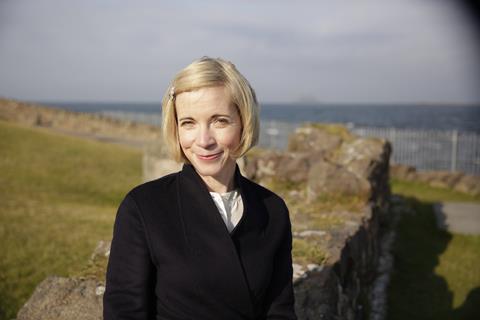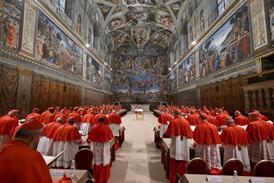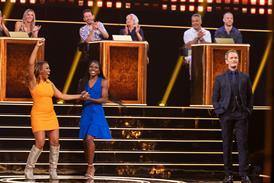“Fans of Prof Lucy who hoped to see her dressed up in a pointed hat with a broomstick were disappointed. This documentary was a more sombre affair”

“This new series, casting Worsley as an inky-fingered sleuth shedding new light on well-worn episodes in British history, could run and run. Her director still fetishises her shoewear with close-ups of clacking Marplesque heels, but there’s now less artful twinkling and more impassioned sincerity. This was sober, research-based storytelling, with field trips to overgrown ruins and museum storerooms. The only glimmer of impish wit was in Forfar, where the camera spotted a black cat on the prowl.”
Jasper Rees, The Telegraph
“Fans of Prof Lucy who hoped to see her dressed up in a pointed hat with a broomstick were disappointed. This documentary, the first of four delving into dark corners of British history, was a more sombre affair. The presenter spent much of the episode visiting historians and exploring libraries around Scotland, where the notorious cat incident occurred in 1591. It was plain that Lucy was not in a frivolous mood from the way she sat in the back of her chauffeured car between museums, gazing thoughtfully at the countryside.”
Christopher Stevens, Daily Mail
“The dead cat story was certainly a vivid start as Worsley began her hunt for clues to why hundreds of women fell victim to a century of state-sanctioned killings. Inevitably, this soon became history that walks to the rhythm of barely concealed antipathy at injustices past. Worsley ended up visibly angry, and fair enough.”
James Jackson, The Times
“Hundreds of years later, the temptation was to roll your eyes at a story that played out like a real-life version of the ‘She’s a witch!’ sketch from Monty Python and the Holy Grail. But there was nothing funny about the brutal torture inflicted on these women. Or about the misogyny behind it. It would be easy to dismiss this as merely a dusty history lesson, but Worsley pointed out that there had never been any real reckoning with a bloody stain on the national memory.”
Ed Power, The i
State of the Union, BBC2
“The pleasure of this intimate, theatrical format is that it places such focus on the performances. Quite literally, as Stephen Frears’s sensitive direction is full of revealing close-ups, although it avoids feeling too stagey by matching the rapid rhythm of Nick Hornby’s wittier exchanges in its crisp editing.”
Marianka Swain, The Telegraph
“It is unusual, in a dramatic sense, in that it feels slovenly and sticky when it is all about conflict, but vastly improves when the tension between Ellen and Scott dissipates. Once they begin to have more even-handed chats – about the nature of intimacy and sex; about what they expect from life, now that they have reached this point; and about what it means not only to be happy, but to pursue happiness – then it becomes endearing, and plays to everyone’s strengths. As a zippy drama about a marriage in crisis, it is so much better without the crisis.”
Rebecca Nicholson, The Guardian
“Scott was troubled by the woke barista, then found himself in a linguistic debate with his dissatisfied, fellow sixtysomething wife, Ellen (Patricia Clarkson), about gender pronouns. In such ways, Nick Hornby’s sequel series — sparky dialogue wrapped in a contrivance — is not just a portrait of a marriage on the rocks but of a dinosaur struggling to fit in the new world of cultural correctness.”
James Jackson, The Times
Bake Off: The Professionals, Channel 4
“The Great British Bake Off’s younger sibling is back with a major recipe tweak. Presenter Tom Allen has been replaced by Stacey Solomon and, in this first episode, her big sister energy went down a treat alongside regular co-host Liam Charles. While The Professionals is less heartwarming than Bake Off, it makes for entertaining viewing with judges Benoit Blin and Cherish Finden not holding back in their adjudications. Newcomer Solomon, meanwhile, blended in perfectly.”
Ed Power, The i
“Gentleman Jack Changed My Life could have been gruesomely self-congratulatory. But instead, it presents real women’s stories simply and unsensationally, letting the whole work serve as a tribute to Lister’s strength and to the programme by being a striking contribution – as direct as Jack herself – to lesbian visibility. At a time when many lesbians still struggle for the freedom to love who and how they want, it feels like a quiet act of resistance to have such a celebratory show.”
Lucy Mangan, The Guardian





























No comments yet